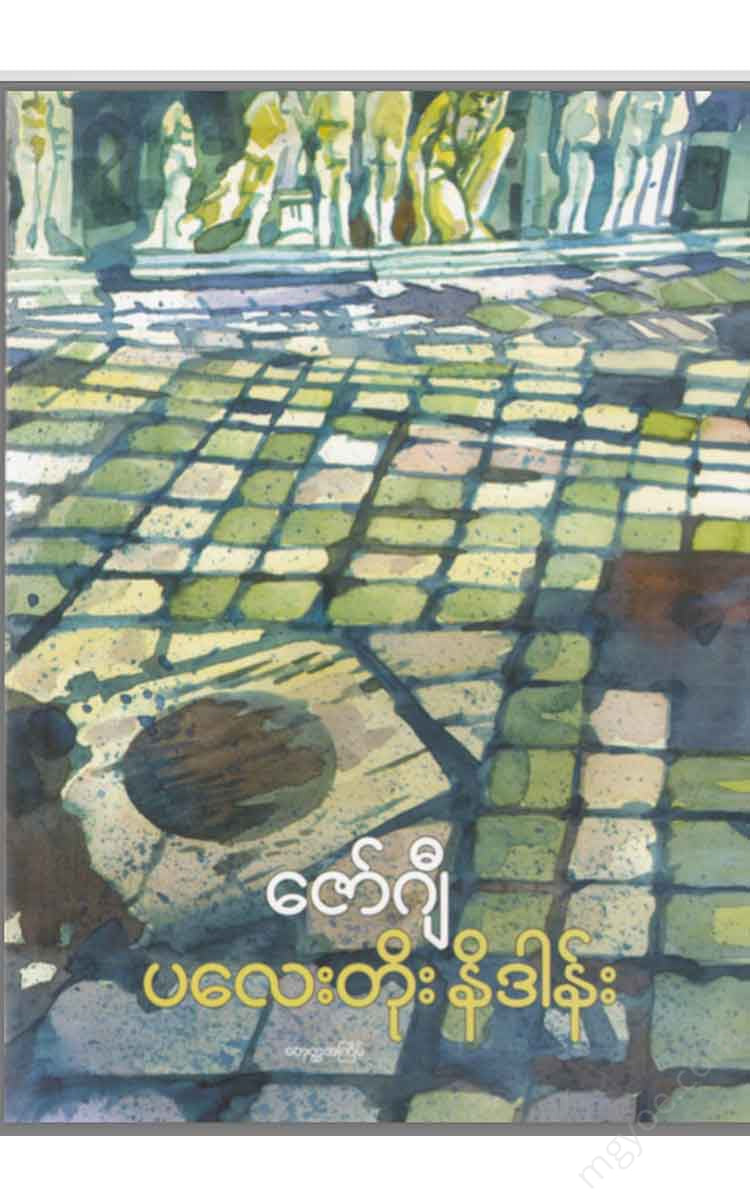Other Websites
Zawgyi - Introduction to Plato
Zawgyi - Introduction to Plato
Couldn't load pickup availability
Plato is said to have been a disciple of Socrates. At the very least, he admired Socrates and accepted his methods. In many of Plato's writings, Socrates is mentioned as the leader. Therefore, it is worth knowing these two people together. In turn, if you want to know about these two people, I think you should know about the ancient Greek region and the ancient Greek world where these two people flourished as a background.
(a) A brief history of ancient Greece
(500-300) BC Socrates was born in Athens, Greece, in 469 BC and died in 399 BC. Plato was born in Athens in 427 (428?) BC and died in 347 (348?). Both men flourished in the period from the late fifth century BC to the early fourth century BC. If we compare the seven years of Socrates' birth and Plato's birth with those of Buddhism, we can say that Socrates was born about 17 years after the Buddha's (566-486?) passing away in the middle of the Ganges River valley, about 58 years after his death. It is not true that this period was parallel to the Buddhist period in the Mizzima region, but it can be said to be a slightly later period.
Greek region
More than 300 years before Socrates was born, or around 800 BC, the Greeks had established small city-states in the Peloponnese peninsula, on the southeastern tip of Europe. In ancient India, sixteen kingdoms and sixteen states were established in the Middle East. Among the many city-states, Athens, Thebes, Corinth, and Sparta were prominent. Athens, the birthplace of Socrates and Plato, was the most prominent. Of the states and states in the Middle East, Magadha and Pataliputra were the most prominent, and the people living in each of these city-states were Greeks and spoke Greek. However, they established separate states and lived with their own rulers.
Persian War
As the Greek city-states in the Peloponnese peninsula grew, so did the Persian Empire in Asia (now Iran). Around 500 BC, the mighty Persian Empire expanded into Western Europe. At that time, Athens took the lead in resisting Persian expansion. The smaller Greek city-states united and came to Athens' aid, and by 479 BC, the Persian invasion had been defeated beyond repair. This is a good indication of how enthusiastic the Greeks must have been. In particular, the fact that Athens, in the forty years following the Great War, grew rapidly and became great in every direction was partly due to its victory in the Persian War.
The glory of Athens
Especially during the thirty-year reign of Pericles, who was elected in Athens from 461 BC to 431 BC, when Socrates was eight years old, the success and progress of the city-state of Athens became a milestone in world history. The power of the Athenian navy was very strong in the eastern part of Greece. It was able to protect the Greek city-states. Therefore, many small Greek city-states began to swear allegiance to Athens. In turn, Greek democracy flourished under the administration of Athens. Crafts flourished. Agriculture developed. Domestic and foreign trade expanded. Athens' economic situation is said to have reached its peak. In addition, education expanded. Architecture and architecture flourished. Greek historical literature and Greek drama flourished. Small Greek city-states came to Athens to teach.
Peloponnesian War (431-404)
Around 431 BC, as Athens grew stronger, some of the smaller city-states became dissatisfied. Some joined the Spartan city-states. Athens was too powerful, so Sparta led a rebellion against Athens. In addition, in 431 BC, a plague broke out in Athens, killing many people. Pericles was also involved in the disaster. From then on, the Greek city-states in the southern part of the Greek peninsula, called the Peloponnese, became unstable and fought each other. The leader of the smaller city-states that rebelled against Athens was Sparta. Athens and Sparta fought each other for about 30 years. In 404 BC, Athens surrendered to Sparta. Sparta formed a triumvirate of thirty men, consisting of thirty Athenian leaders, to rule the city-states. However, within the city-state of Athens, there were those who rebelled against the Thirty, and in 399 BC the Thirty fell and the Greek democrats returned. However, democracy was no longer as it had been under Pericles, and it seemed to have no proper control. Once again, Sparta, the new leader of the Greeks, became a tyrant, and the small city-states formed groups as before. Fearing that one state would become too powerful, they still fought each other. However, they could not reconcile, and in 338 BC the whole of Greece fell under the rule of the foreign king Philip of Macedonia, the autocratic king, and the ancient Greek era came to an end.
(b) Administrative, economic, social
Each Greek city-state was the size of a modern township, and the total population was said to have been about fifty thousand. At that time, the city-state of Athens alone had a population of over three hundred thousand. In addition, only about one-third of the population had the right to participate in the administration. About two-thirds were merely the governed class.
Administration
In the 5th century BC, two main types of elected government emerged in Greece. In city-states like Sparta, only the landowners and feudal lords were full citizens, and only from that group were elected to govern. This group ruled over the peasants, the poor, and the slaves. This system was called an oligarchy. In city-states like Athens, however, the number of citizens eligible to participate in the government was much higher than in city-states like Sparta. Then, not only from the landowners and feudal lords, but also from the merchants, artisans, and farmers could be elected to govern. This system was called Greek democracy. In the 5th century BC, the total population of Athens under Pericles was said to be about 350,000 (350,000). They could not vote, Excluding the ineligible slaves and foreigners, the population who could vote and participate in the administration was said to be about one hundred and eighty thousand (180,000). These one hundred and eighty thousand Athenian citizens could attend the People's Assembly and carry out legislative matters. The People's Assembly met once a month. At that time, there was no separate appointment for administrative service. Therefore, five hundred people were elected from among the one hundred and eighty thousand to carry out administrative matters. In turn, fifty of these five hundred were divided into groups, each of which was responsible for administrative matters for 36/2 days. Only the generals of the army and the generals of the navy were appointed. The appointments were usually renewed or renewed every year.
Judiciary
In the case of adjudication, the people appointed citizens who could be expanded from 101 to 1001 depending on the size of the case. At that time, there was no such thing as a lawyer. The plaintiff himself argued the case he wanted to sue. The defendant argued his own case. After hearing the case, the judges decided the case by voting. In this way, we can estimate how many civic duties the Athenian citizens had and how they were skilled in social speech. From the very beginning, the feudal system dominated ancient Greek society. However, serfs, indentured servants, and the poor who were not slaves had no rights. They were only servants. Only when the city-state of Athens became powerful and trade increased in the fifth century, did the poor who were not slaves gain opportunities due to good domestic and foreign trade, and merchants, artisans, and artists gained opportunities. The Greek peninsula is mountainous and cannot grow much fruit. Fruit is purchased from the small islands surrounding the peninsula, as well as from Asia and Egypt. Olive trees and grapes are grown in large numbers on the peninsula, and olive oil and wine are sold abroad. In addition, because of the silver mines in the city-state and the abundance of handicrafts, silverware is also sold. It also produces and sells military weapons such as spears, swords, bows, arrows, shields, and armor.
Those who could afford it hired teachers and educated their children at home. There was no separate school. Musical instruments and dance were highly respected. Sports were even more respected. Gymnasiums were set up and teachers trained them. They competed in the Olympic Games, which were held every four years. For higher education, there were Sophists around the 5th century. These teachers traveled to the city-states of Greece and taught higher subjects for a fee. They had to use their speech in parliament and in the courts, so they learned the art of speaking and rhetoric.





